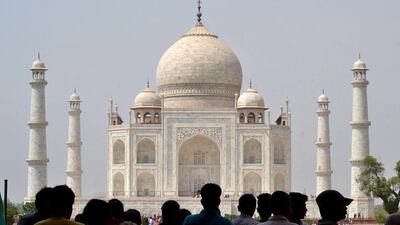When Mughal emperor Shah Jahan built a stunning mausoleum for his wife, Mumtaz Mahal, it was a deeply personal gesture. Today, the Taj Mahal is anything but.
Considered one of the seven wonders of the world, the architectural marvel attracts as many as 70,000 visitors a day. Famed for its beauty and symmetry, the monument no longer belongs only to the state of Uttar Pradesh, where it is to be found. Rather it belongs to the world.
As a result, those tasked with conserving it, with its magnificent marble walls and bejewelled interior, have a duty to the rest of the world. But in recent years, their failure to do so has sparked an angry debate within the country.
India’s Supreme Court this week chided authorities for their lethargy in preserving the monument. “Either we shut down the Taj or demolish it or you restore it,” said the court on Wednesday.
Once a brilliant white, the Taj Mahal's walls no longer gleam. Rather, particulate matter released by heavy industry nearby has left a brownish-green hue. Meanwhile, throngs of insects drawn to the deluge of waste that flows down the adjacent Yamuna river by the Taj Mahal have infested the monument and stained its walls.
It is a fate that has befallen many monuments in the care of the corruption-prone Archaeological Survey of India. The country’s highest court is right to demand foreign assistance be sought if local authorities cannot preserve the structure.
But the Taj’s decay raises another, far more insidious, issue, namely the endemic bias that promotes Hindu monuments over Muslim ones. Last October, the Taj was excluded from an Uttar Pradesh tourism brochure after the state’s chief minister Yogi Adityanath said the mausoleum did not reflect Indian culture.
The unpleasant episode revealed a deep rot within Indian conservation – and society. Such attitudes miss the point of monuments like the Taj Mahal. They are not preserved to exhibit the superiority of any religion or culture, but to promote understanding and to inspire.
The Taj Mahal belongs to the world. It is time that Indian authorities mobilised to preserve it for us all.

